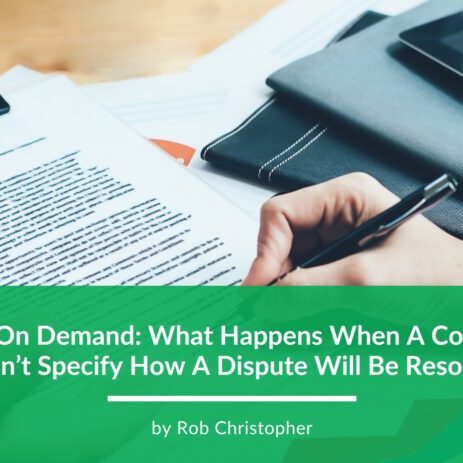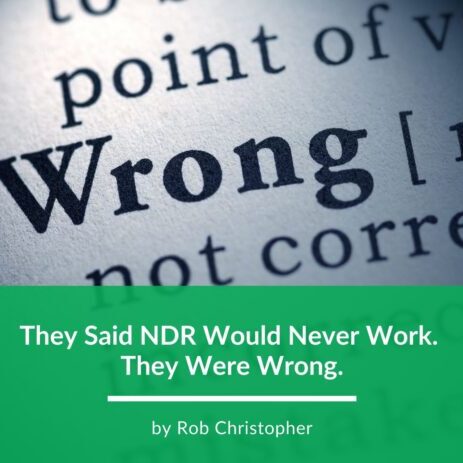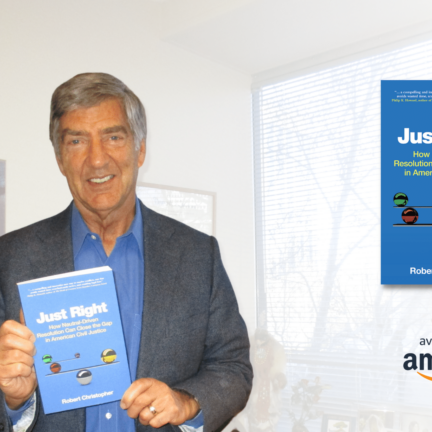Why Lawyers Should Like Neutral-Driven Dispute Resolution
NDR – Neutral-Driven Dispute Resolution – is a less costly and less adversarial way to settle limited-stakes business disputes. It’s driven by neutral judges, peers, or experts, agreed upon in advance by both parties. It’s faster, more affordable, and more collaborative for everyone involved.
So, as a lawyer, you may ask, “What’s in it for me?”
It’s true that NDR removes legal battles from the process of settling these types of disputes, which traditionally can often cost more in legal fees than the amount a business owner is trying to recover or defend. But that doesn’t mean lawyers should ignore NDR. There are many reasons why they should view NDR as another arrow in their quiver, a complementary tool to better serve clients facing common business disputes.
Let’s face it. For busy attorneys, these limited-stakes disputes about money in the five and low six figures range are almost a nuisance. Some lawyers even call them “dog cases,” and for a reason: They know from experience that any formal legal process to resolve them – whether arbitration, mediation, or litigation – will be a long, tedious and contentious process that in the end probably won’t make economic sense for their client. To avoid these dogs, some conscientious lawyers won’t even take cases below a $500,000 threshold because they know their client will be unhappy with the ultimate result.
Not every lawyer will say it out loud, but there’s no question that many feel trapped in a system and culture that should be able to deliver real justice in common disputes but often falls short. NDR offers a way out. It delivers real justice to honest businesses and individuals when the traditional adversarial approach is just too expensive and grossly inefficient.
Here are a few key reasons why lawyers should welcome NDR with enthusiasm and seek to optimize its use wherever and whenever it makes sense:
- NDR is good for your clients. It’s good for their money, their time and energy, their dignity, their reputations and relationships, their peace of mind. In other words, with NDR in your active tool kit, you will better serve your client.
- Proposing NDR helps get better net results for your clients in negotiations. In fact, even when a client loses a case, there will be a better net result because using NDR will have cost far less money and time.
- Proposing NDR when appropriate earns client loyalty. It proves that you put the interests of your client first. If your client rejects it, it allows you to proceed traditionally with a clear conscience that you did all you could to avoid undue time and expense.
- NDR is good for legal practices. It helps litigators by enabling them to focus on larger and more lucrative matters, and better handling (such as referral to NDR) of uneconomic matters, with the potential to increase a client’s trust.
- NDR is good for the legal profession’s reputation. In fact, it directly refutes and shrinks the profession’s sad reputation for undue greed and provocation.
- NDR is good for society. It helps close the civil justice gap for poor and wealthy alike, and helps optimize everyone’s precious resources of time, energy and money, yet it still preserves the right to seek vindication, all while reducing destructive anger, hate and resentment.
While NDR changes the lawyer’s role in the dispute process, it doesn’t replace their expertise. In fact, the NDR revolution won’t happen without the active support and encouragement of the legal profession. Lawyers just need to better understand how it works and how it can help both them and their clients.
And now, lawyers can earn MCLE credits from learning about this innovative approach through an engaging MCLE course led by Rob Christopher, an accomplished AV Preeminent rated litigation attorney and author of the upcoming book Just Right: How Neutral Driven Resolution Can Close the Gap in American Civil Justice. For more information and to sign up for the course, visit https://www.mclez.com/cle/shop/courses, select your state and choose the Neutral Driven Resolution course. For those in CA, it is available within the 25 course Bundle A- www.mclez.com/california-mcle.
More to read
NDR on Demand: What Happens When a Contract Doesn’t Specify How a Dispute Will Be Resolved?
The best way to deter threats of litigation and minimize the costs, duration, and distractions of resolving any dispute is to put a dispute resolution clause specifying NDR — Neutral-Driven Resolution — in all your contracts BEFORE there is a problem. That means that if a dispute should arise between a business and a contractor,…
They Said NDR Would Never Work. They Were Wrong.
Many people are surprised by how effective NDR can be. Since publishing my book and speaking at events about NDR (Neutral-Driven Resolution), I’ve often been asked a simple question: Does it work? And if it really does lower the costs and the time it takes to settle common disputes, why doesn’t everybody know about…
“Morgan Hill author releases new book”
The Morgan Hill Times featured Rob’s new book in an article ahead of his “Meet the Author” night at Booksmart. “Legal disputes and conflicts cost businesses billions of dollars a year in lawyers’ fees, lost productivity, time and aggravation. A new book by Morgan Hill author Robert Christopher proposes an innovative, faster and simpler way…
Not All Disputes are Equal
Not all business and legal disputes are alike, and not all of them can be resolved in the same way. In writing my book Just Right: How Neutral-Driven Resolution Can Close the Gap in American Civil Justice, it was important to distinguish the types of common disputes for which NDR is most suitable. As readers…



